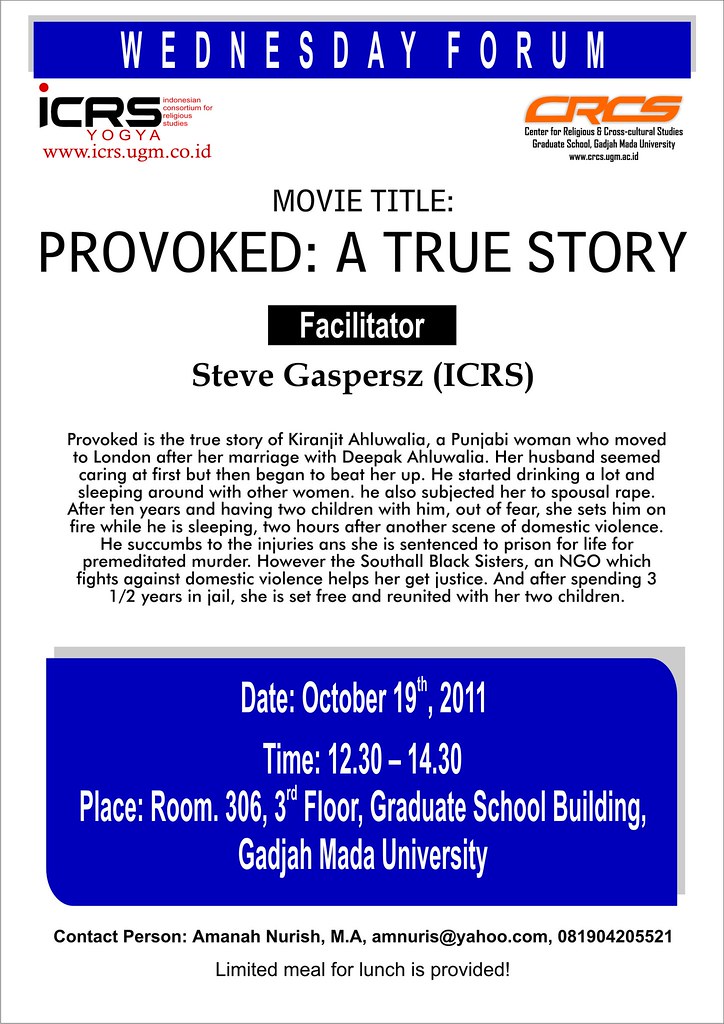Waria is the common Indonesian word for transgender. It comes after wanita (female) and pria (male). In the context of Islamic communities, Indonesian warias have problems religious representation because in Islam, there are clear distinction between male and female, especially when it comes to worship activities. However, some warias in the city of Yogyakarta find their Islamic religious freedom in a pesantren (common Indonesian traditional Islamic school) which is specially established for waria. It is called Pesantren Senin-Kamis (Monday-Thursday Pesantren) since the pesantren is only active on those two days.
Wednesday forum is a weekly public discussion on various topics of religion and culture organized by CRCS and Indonesian Consortium for Religious Studies (ICRS). The forum is held every Wednesday at 12.30 – 2.30 PM in room 306 (3rd floor) of UGM graduate school building. Since 2002 many scholars, students, and researchers worldwide have presented their papers or on-going research in this forum.
Anyone who wants to make a presentation in this forum should fill out the Wedforum-form and send it to wednesdayforum@yahoo.com and crcs@ugm.ac.id. For further information and inquiries, please feel free to contact the organizer Najiyah Martiam (jim) at jiahjim@yahoo.com or Amanah Nurish at amnuris@yahoo.com.
_resize.jpg)
Waria merupakan istilah yang popular di Indonesia untuk menyebut personal transgender, sosok laki-laki yang berperilaku menyerupai wanita (perempuan). Dalam konteks masyarakat Islam, waria dibelit oleh berbagai persoalan karena dalam Islam ada perbedaan yang jelas antara pria dan wanita, terutama dalam hal ibadah.
Menyikapi garis batas ini, beberapa waria di kota Yogyakarta mencoba melepaskan diri mereka dari belenggu fiqih baku Islam. Mereka berinisiatif mendirikan pesantren yang khusus diperuntukkan bagi waria dengan nama Pesantren Waria Senin-Kamis. Pesantren unik ini didirikan pada tahun 2008 oleh Maryani, (seorang waria) bersama Kyai Hamroli ingin menunjukkan bahwa waria punya hak untuk menjalani ibadah sesuai dengan agama yang mereka peluk (dalam konteks ini agama Islam).
Mohammad Iqbal Ahnaf, Ph.D | CRCS | Article

The most welcomed aspect of Indonesia’s democratization is probably political freedom. This is marked by the flourishing social organizations that illustrate the resurgence of civil society. However, strong society, although idealized, is not always positive for a democracy. This is especially true in a state with a weak government.
A distinguished political scientist, Joel Migdal in his book, Strong Societies and Weak States: State-society Relations and State Capabilities in the Third World (1988) warned of the risk of having a strong civil society in a state with government lacking the ability to govern. A common consequence of weakened states is that the government lacks political will, institutional authority and organised power to provide basic functions of the state. If the state is unable to fulfill these functions, a power void will result and may lead to the rise of strong societies.
Suhadi Cholil | CRCS | Article
Pada tahun 1977, Mochtar Lubis berceramah di Taman Ismail Marzuki yang kemudian dibukukan dengan judul “Manusia Indonesia”. Saya menduga, kalau ceramah itu dilakukan hari-hari ini, Mochtar akan menambahkan satu karakter lagi dalam karakter ketujuh, Manusia Indonesia: Manusia Koruptif.
Belum usai gaduh kasus korupsi di Kemenpora dan Kemnakertrans, atau sebelumnya hingar-bingar kasus Century dan Gayus, kini diduga Banggar DPR pun melakukan penggembungan (mark up) APBN tahun 2011 senilai Rp 27,5 triliun. Meratanya korupsi hampir di setiap sektor birokrasi pemerintahan dari eksekutif, yudikatif, sampai legislatif memunculkan pertanyaan besar, benarkah manusia Indonesia itu manusia Koruptif?


